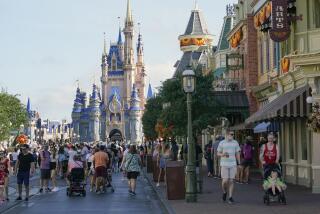Report Says Disney Overstates Benefits of History Theme Park
- Share via
WASHINGTON — The battle between Walt Disney Co. and community groups in northern Virginia opposed to the company’s plan to develop a 1,200-acre historical theme park is heating up as the two sides argue over the number of jobs and the amount of revenue the park would generate.
A new report commissioned by a group opposing the park--which would feature attractions representing scenes from American history--charges that the park would create only half the approximately 12,000 jobs and less than a quarter of the $22.6 million in annual tax revenue Disney has estimated.
“Disney’s figures appear to be so flawed that we should treat any promises of future benefits from the company with great skepticism,” said Chris Needels, director of Disney Take a Second Look, the group that commissioned the study. The report also charges that Disney has failed to discuss related education, fire and police costs to Prince William County and the state of Virginia.
Disney officials challenged the study’s validity, saying the researchers made projections without consulting county officials or sources at Disney for necessary information.
“We are the people that understand our visitors and their spending patterns, and the county (officials) are the people that understand the cost structure,” said David Hodess, director of Disney’s America, the name given the proposed park Disney hopes to build in a rural area near Haymarket, Va., about 35 miles west of Washington.
“The people who published this study, to my knowledge, didn’t contact anybody at Disney . . . and to my knowledge they did not have any detailed discussions with the county about what those cost estimates might be.
“Without significant contact with those people, it seems difficult for me to believe that you can really produce a report with a lot of validity,” he said.
Hodess added that accurate estimates of the cost of services to the county were unavailable and that Disney had acknowledged as much. “The only way to really ascertain those costs is for we, who run the business, to sit down with the experts and build up some estimates for what their costs might be. It’s difficult to believe that (researchers) have gone through that rigorous process.”
Disney officials also said they are standing by their estimates. They even called them conservative and said they expect the actual number of jobs and amount of revenue the park would generate for the region to be higher than their projections.
Asked about Disney’s criticisms, Needels said the group had spoken with county offices but were referred to Disney. The Disney offices, he said, “had no particularly hard data available.”
The study was conducted by Thomas Muller and Michael Siegel, independent analysts in the Washington region with extensive experience as consultants to state and local governments.
The study also found that many jobs the park would bring would be low-wage, low-skill work in the hotel and restaurant fields, in which wages average roughly half the average pay in the county. It also found that the county would receive between $1.5 million and $5.1 million a year in tax revenue from the park, a figure significantly lower than Disney’s estimate of $14.1 million.
The latest exchange in the feud between Disney and opponents of the theme park has come at a time Disney is stepping up its campaign to win approval. In the coming weeks, the proposal will go before numerous federal, state and local government bodies.
Overall support for the project among residents of the area has been difficult to measure. A number of small groups have protested loudly, arguing that the theme park would destroy the region’s rural way of life and tamper with Virginia’s historic flavor. Others, such as the Coalition of Gainesville District Residents, one of the largest citizens groups in the region, have been neutral on the issue.
The Welcome Disney Committee, consisting mainly of local business executives, says the park would broaden the area’s tax base. Republican Gov. George F. Allen favors the project as a boost to the region’s economy.
More to Read
Inside the business of entertainment
The Wide Shot brings you news, analysis and insights on everything from streaming wars to production — and what it all means for the future.
You may occasionally receive promotional content from the Los Angeles Times.










